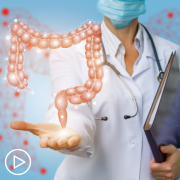What Should Be Considered When Choosing a Colon Cancer Treatment Approach? from Patient Empowerment Network on Vimeo.
Dr. Smitha Krishnamurthi, a colon cancer specialist from Cleveland Clinic, reviews considerations when choosing therapy, including staging and test results, as well as how clinical trials fit into treatment planning.
Dr. Smitha Krishnamurthi is a gastrointestinal medical oncologist at the Cleveland Clinic. Learn more about Dr. Krishnamurthi here.
See More From The Pro-Active Colon Cancer Patient Toolkit
Related Resources:

Newly Diagnosed With Colon Cancer? Key Advice From an Expert |

Your Colon Cancer Care Colon Cancer Toolkit: Office Visit Planner
|

How Speaking Up Can Positively Impact Your Colon Cancer Care
|
Transcript:
Katherine Banwell:
What are the main factors you take into consideration before a treatment approach is decided on?
Dr. Krishnamurthi:
For treatment of anyone with colorectal cancer, most important, of course, is the stage because stage determines whether it’s surgery alone or do we need to use chemotherapy or radiation? Or if it’s metastatic, is it systemic treatment only? We also look at the biologic features of the cancer, which we’re learning more and more are very important.
For example, we want every patient to know their DNA mismatch repair status. This is basically, is the cancer missing a gene that repairs damage to DNA? Then if that’s true, then we say they are DNA mismatch repair deficient. Or another term is “high microsatellite instability.” Mismatch repair deficient or microsatellite instability high, or you might hear MSI high.
That’s very important that we test that on all patients with colorectal cancer because in the early stage setting, it’s important because this is a way to identify patients who may have Lynch syndrome, the most common type of inherited colorectal cancer.
And also it impairs their prognosis. We know these patients tend to have a better prognosis. For example, for stage 2, we wouldn’t even have a conversation about chemotherapy if we know the patient has abnormal DNA mismatch repair or is MSI high. Then for patients of metastatic disease, it’s very important to know this upfront because those patients do better with immunotherapy as their first treatment.
So, we want to see those results for each patient. Then for our patients with metastatic cancer, we also need to see some other genetic mutations such as RAS, KRAS and NRAS gene mutations, because that affects what treatments we use.
Also, BRAF gene mutations are very important because of the particular regiment we use for treatment of that type of cancer.
We’re looking at the extent of the disease, what are the molecular features, and then also, of very importantly, what can the patient tolerate? What are the patient’s goals? We have a discussion about side effects and help them make the best choice for themselves.
Katherine Banwell:
Where do clinical trials fit in?
Dr. Krishnamurthi:
That’s an excellent question because clinical trials actually could be appropriate at any step along this pathway.
There are clinical trials that may be looking at tests to diagnose cancer better or detect it earlier.
There are treatment trials where they may be looking at standard treatment versus something investigational or standard plus investigational. Those sorts of treatment trials may be very interesting as the initial treatment or they could be used when a person has gone through all the standard treatments. Then there’s nothing left to do but try investigational. There are also studies that are looking at supportive care – a new treatment for nausea, for example. There are studies that are looking at the biologic factors of the cancer. Maybe asking a person to donate blood or give permission to use their tumor sample. By participation in these studies, people who volunteer for that are being so generous with their time and their lives.
But that’s how the field advances, especially for treatment trials. This is a way to access cutting edge treatments because the study is being done because the drug looks promising.
I think it’s very important to ask about clinical trials from the beginning and every time there’s a decision point made in the treatment.










